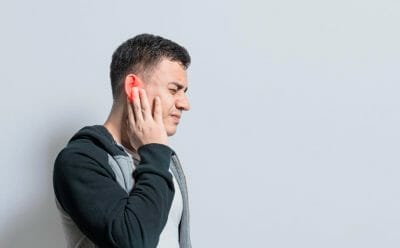As enigmatic as it may appear, there can be an unexpected link between tooth discomfort and earache. In this article, we disentangle the possible reasons and circumstances that indicate the unspoken connection between ear pain and dental problems. Explore this fascinating journey to learn how seemingly unconnected topics may hold the secret to relieving dental and hearing discomforts.
Tooth pain that can cause ear pain includes dental infections and abscesses that can spread to the surrounding tissues, including the jaw and ears, causing earache if left untreated.
Temporomandibular Joint Disorder (TMJ): TMJ problems can lead to jaw joint pain and discomfort that can spread to other body parts.
Bruxism (Teeth Grinding): Excessive clenching or teeth grinding can put undue stress on the jaw muscles and cause pain radiating to the ears.
Dental treatments and Ear discomfort: Because the jaw and ear components are so close, some dental treatments, including extractions or dental implants, may refer to ear discomfort.
The connection between Sinusitis and Tooth Pain: Due to the proximity of the sinuses to the ears, sinus infections or inflammation can cause tooth discomfort that may be mistaken for earache. Impacted or out-of-alignment or misaligned teeth may put pressure on the ears or other adjacent structures, resulting in discomfort.
Nerve Irritation: Because the facial and dental regions’ nerves are interrelated, pain in one place, like the ears, can occasionally be caused by irritation in another.
It’s important to understand that ear pain caused by dental problems may be difficult to diagnose precisely. Visit a reputable dentist Brighton offers to get individualised recommendations on the treatment of ear pain caused by teeth. The underlying reason for the discomfort can be found, and the best course of action can be decided upon by seeking professional evaluation from a dentist and a medical expert.
Prevention and treatment of ear pain caused by toothache
Oral hygiene: To avoid dental infections that could cause ear pain, it’s essential to practise good dental and oral hygiene. Flossing and brushing twice daily and regular dental checkups can all help prevent dental issues.
TMJ Management: People with TMJ problems must obtain expert advice from a dentist or oral surgeon. They can offer individualised treatment programs, such as mouthguards or jaw exercises, to properly control ear pain brought on by TMJ.
Control of Bruxism (Teeth Grinding): If teeth grinding is the cause of your ear pain, wearing a nightguard while you sleep can assist in safeguarding your teeth and relieve stress on your jaw and ears.
Regular Dental Checkups: By identifying and treating dental problems early, regular dental checkups enable dentists to lower the incidence of ear pain from untreated tooth diseases.
Management of Sinusitis: Effective sinusitis therapy helps reduce ear and dental pain brought on by sinus-related conditions. Correct diagnosis and therapy might be aided by consultation with a medical expert.
Management of Stress: Stress can cause ear pain by causing bruxism and TMJ problems. Activities like yoga and meditation can relieve discomfort.
Expert Evaluation: It’s critical to get evaluations from a dentist and a medical expert simultaneously if you have ear pain and think it might be dental-related. They can work together to determine the underlying problem and develop a successful treatment strategy.
Open Communication: Maintain open lines of contact with dental and medical specialists, discussing any worries or symptoms you may have to aid in precise diagnosis and individualised treatment.
People can reduce the incidence of teeth-related ear pain and maintain ideal dental and ear health by taking these preventive steps and ensuring they do so according to professional advice.
